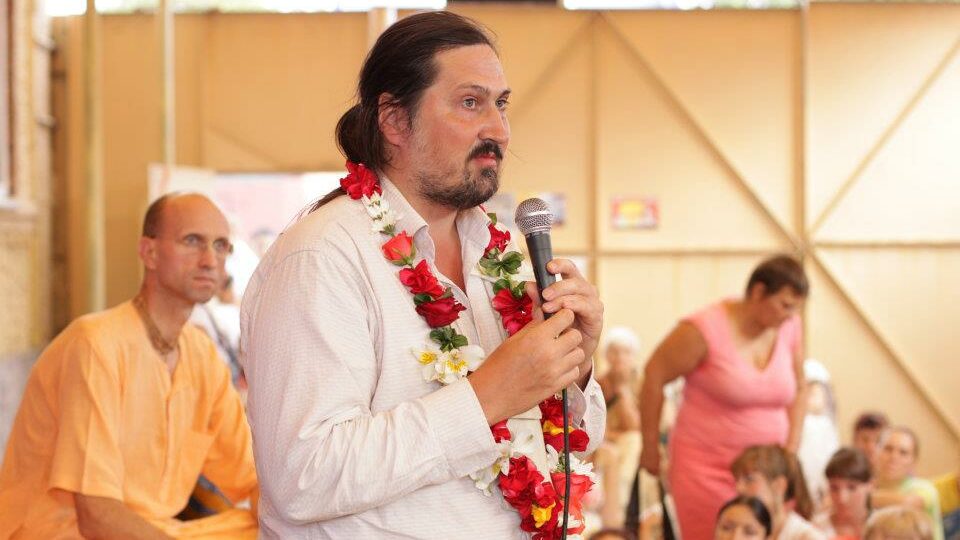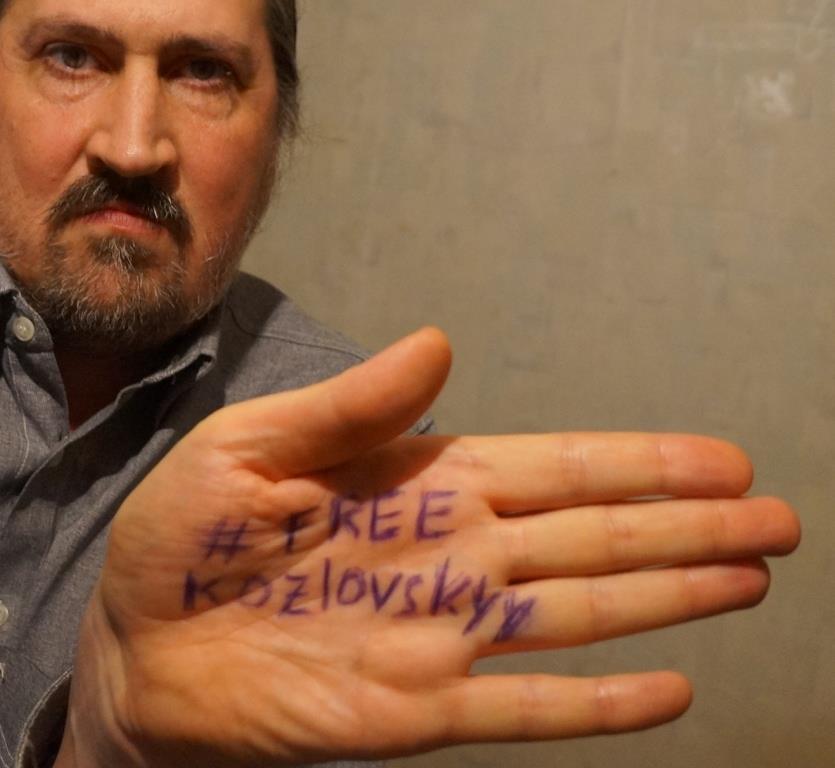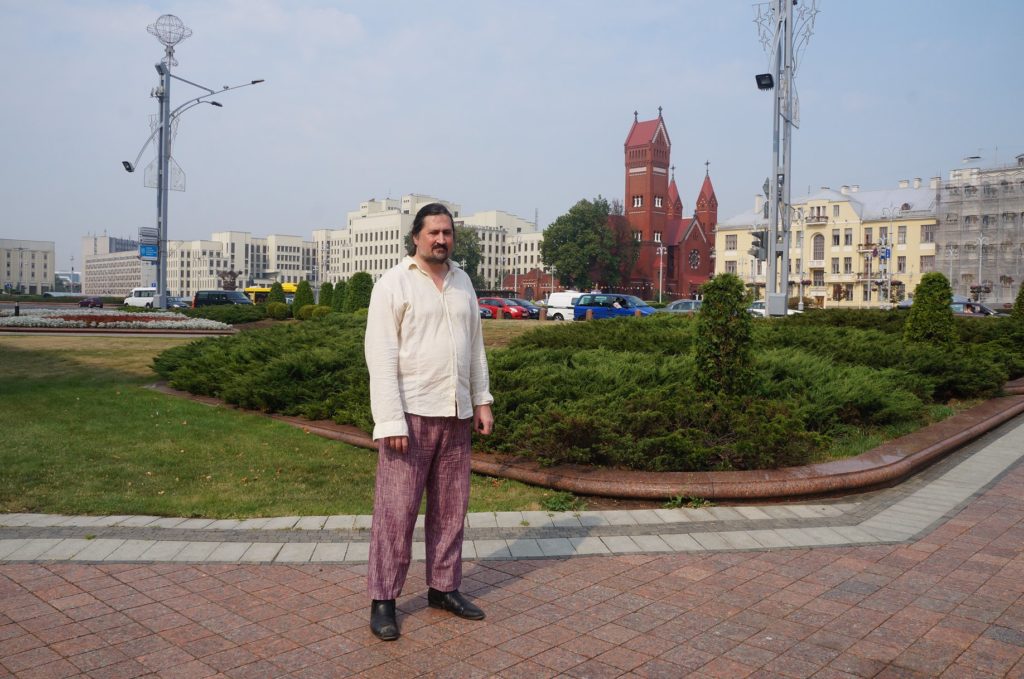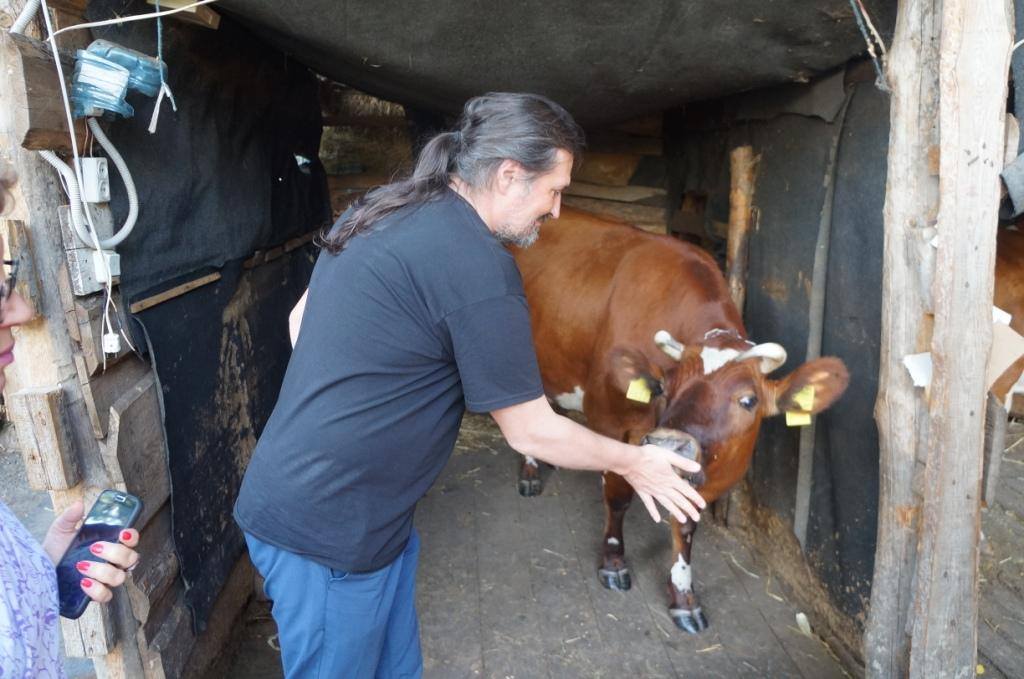Thursday, January 5, 2023
Nikolai Karpitsky. November 24, 2022. Ukraine. Two hundred and seventy-fourth day of war
Tuesday, January 3, 2023
Nikolai Karpitsky. December 13, 2022. Ukraine. Two hundred ninety-third day of the war
Nikolai Karpitsky. We need the idea of de-imperialization. 15.06.2022
Nikolai Karpitsky is a philosopher and public figure from Tomsk. He spoke out against the wars in Chechnya. And against communist ideology. He defended the Bhagavad-Gita in court - remember that resonant trial over the book? Nikolai Karpitsky has been living in Ukraine since 2015. For the past three years he has been living in Slavyansk, on the outskirts of which he bought a small house three years ago. Since February 24, 2022, he has been conducting the "Chronicle of the People's War". Fragments of it, along with a story by Nikolai Karpitsky, are in the "Eyewitnesses" project.

February 24, 2022. Ukraine. The first day of the war. My first post since the war began. I wrote here on Facebook on February 9 that Russia has enough power to launch a first crushing strike against Ukraine and destroy much of its economy and military capabilities, but Ukraine has enough power to handle an invasion. So now I believe that the first crushing blow won't work either..."
- On February 24, I was in Kiev. I woke up in the morning and looked out the window: a siren was blaring. I took the train to Slavyansk. I started chronicling what was going on day by day. My first reaction was: could we withstand a blitzkrieg or not? Because the enemy always plans a blitzkrieg, not a protracted war. If we hold out, then we can talk about Ukraine's chances. After three days of war it became clear that the blitzkrieg was not successful, and the second phase of a terrible bloody war began. Which will inevitably result in the extermination of the civilian population.
"February 27, 2022. Ukraine. The fourth day of the war. The spring thaw. Huge losses of Russian equipment are also due to the fact that it is impossible to advance in the fields now - abnormal heat, the equipment will simply sink in the mud. We have to drive on the highways, getting into ambushes. The Ukrainian army withstood the first blow and now the initiative slowly begins to pass to it...".
- When the offensive began, a picture of the world began to take shape. For the first three days, the Russians wanted to surgically remove the government. There had been no targeted bombing of residential areas yet... But when they had to evacuate refugees from Severodonetsk, Rubizhne, Izyum, and Lisichansk, it became clear that buses with refugees were being deliberately shelled. Then the nature of the war became clear. Wars can be civilized and waged to destroy. It is clear that the war in Chechnya and the war in Syria were uncivilized. Cities were destroyed there. But here the hope was that this invasion was purely political. That they would block cities, military units, but there would be no targeted destruction of the population. I had such hope for three days... Now people in general understand who they are dealing with. They understand that this is a war of annihilation. Even those who used to support the separatists are horrified by what is happening.
"March 1, 2022. Ukraine. The sixth day of the war. The situation can be imagined as if a huge boogeyman had attacked a teenager, who, though badly beaten, managed to resist. The big guy realizes that he can't win by leaps and bounds, and now, having evaluated the situation, he's going to attack again. He is in fact a berserker, and can feel no pain, and is incapable of reasoning. If we were talking about an ordinary dictator, albeit a sadist and a scoundrel, but a pragmatic one, then after inflicting substantial losses on the invading army, it would be possible to negotiate peace with him. But we are dealing with Putin, who proceeds from a holistic picture of the world, in which everything is reversed - evil is perceived as good and good as evil. This is a worldview for which I do not know the scientific name, but in Christianity it is called Satanism..."

- I stayed in Slaviansk to describe the situation from the inside. I try to write not so much about events, because everyone writes about events. I try to explain their context. And to write about people's experiences. How to experience it, how to relate to it. When you are involved in events, you awaken a special historical intuition, allowing you to feel what is real and what is impossible... I decided to stay in Slaviansk in order to be able to feel how events are happening. Right now, as we were talking, there was a bang.
«March 14, 2022. Ukraine. Nineteenth Day of War. There were more than a hundred people at the service, four times less than usual. The preacher compared the struggling Ukraine to the exodus of Jews, who were persecuted by the Pharaoh. Faith in God greatly strengthens faith in the victory of Ukraine. Then the refugees from Severodonetsk were brought - many students, children, elderly. The oldest woman was 82 years old. Fed, arranged and the next morning taken to evacuation trains. Everyday a hundred people. <…> Today the holidays ended and I was giving a lecture «Philosophy of human communication». At the beginning, we exchanged information, who is where and in what conditions. A student from Lisichansk listened to a lecture from a bomb shelter, so communication with her was interrupted. I devoted the lecture to the topic of lies, including the one that led to the war. While I was working with my students, I’ve got an information that one of the buses of the church I was in yesterday was shot at on its way from Izyum.…».
- I live among Ukrainians, I am emotionally connected to them. I walk the streets, I go to meetings. There is a Protestant church here that deals with refugee removal. I meet with them, look at their sentiments. Of course, in Kiev the start of the war was a shock, people couldn't understand and accept the reality. It took them some time. And some reactions were naive and strange. They could sit in the subway all day long. But clearly, if the war is for a long time, you're not going to sit in the subway all the time. You would have to get used to it and live a normal life. Despite the bombings and rockets. When I came to Slavyansk, I found that people here were already used to it. They had already seen the war and had a calm attitude. Pragmatically.
"March 24, 2022. Ukraine. Twenty-ninth day of war. When war broke out, the world collapsed. The inevitable happened. It was as if an asteroid had crashed into the earth, and overnight the whole familiar world disappeared, along with daily communication, work, problems, and little joys. Only emptiness lies ahead. After a while, a new shock. It turns out that it is not just emptiness, but destruction, suffering and death. After all, it is not only the army that is at war with the occupiers...".
- As for medications, you can buy simple drugs, but not every pharmacy has them. There is always something missing. The assortment in the stores has decreased by three times. But everything you need is there. At the bazaar, the number of people has decreased by 5-10 times, but people are there and trade. In addition, there are various humanitarian missions. They bring aid. There is a problem with public utilities. Since the water intake is in Mayak settlement, which is on Northern Donets, where Russians are advancing, it is impossible to repair it. The city has been without water for the second week. Some have wells, somewhere water is brought. But there is no opportunity to use water freely now. As for electricity, the high-voltage wires get broken and have to be repaired. Sometimes you are without light for a day or two. The most difficult thing is the uncertainty, because there is no Internet, no communication, and you don't know what kind of danger threatens you.
"March 29, 2022. Ukraine. Thirty-fourth day of war. The Moscow Tsardom, and later the Russian Empire, constantly waged wars of conquest, justifying it with the super-valuable idea of gathering lands. This idea was inculcated in school, and many still accept it by default. The essence of this idea is the denial of the value of independent life outside of Russia. History has often seen empires, dictatorships, tyrannies, which, like Russia, waged wars of conquest. Of course, this is an evil, but an evil that is social, human, but not yet religious or metaphysical. When the military and Chekist coup took place in Russia in 1999, the ideology of gathering land mutated. If before the independent life of the peoples was devalued, but was not considered evil, now the entire surrounding world, which resists inclusion in the sphere of influence of Russia, is perceived as hostile and subject to destruction ...

- I try to assess the danger. And I assess it this way: I just ignore rocket attacks, I don't pay attention to sirens at all. I have a basement in my yard, but it is not equipped. Sitting there is not an option at all. Being hit by a missile is like being hit by a car in a city with a lot of traffic. There's no getting away from it.
"April 6, 2022. Ukraine. Forty-second day of the war. There came a time when the cannonade began to calm me down. I can already distinguish by ear when ours are beating the occupiers. Judging from what I heard yesterday, the fighting on the way to Slavyansk is desperate...".
- Ukraine's victory in the war depends on Western weapons. The Soviet weapons, which were there, have unfortunately run out. The first victories of the Ukrainians were due to the fact that there were still enough weapons. Now they are used up. But the Russian reserves are not limited... If there is a lend-lease, everything we need is here. The Ukrainian army is mobilized, it is superior to the Russian army, it is not surrounded. And no one will throw soldiers as cannon fodder. In the event of a Russian takeover of the whole of Ukraine, this entire army would go to the partisans. Of course, Russia would lose, but at a huge cost to Ukraine. If weapons came, there would be no need to pay such a price.
"May 28, 2022. Ukraine. Ninety-fourth day of the war. Yesterday there was no light, wrote until the laptop battery died, today finished the work. Therefore, the first part relates to yesterday. This week the Donetsk region was finally cut off from gas. In the morning we got water, so we could take a shower. At first it feels strange to be in the shower during shelling or the roar of a siren, but then it becomes indifferent. The lights are still out. I write until the battery runs out. I drove around the city. There are not many people, the stores are out without lights. I like to ride my bike out of town, it's the most beautiful places there, you can't give them up to orcs. But you can't go there now, there's a war going on. There's a lot of banging going on. I cooked potatoes on the fire in the yard - the first time, no experience yet, but I think I'll get used to it...".
- I know that in Russia there were calls to go to rallies - it's the same as in the Soviet Union to rally against the Afghan war ... But everyone in their place can sabotage unconstitutional decisions. And the second point. Without a clear idea of what to strive for, the goal cannot be achieved. This idea has not yet been formulated. Replacing a bad president with a good one will not change anything. We need the idea of de-imperialization. A rejection of the imperial form of government. This idea needs to be communicated. It is quite possible and realistic.